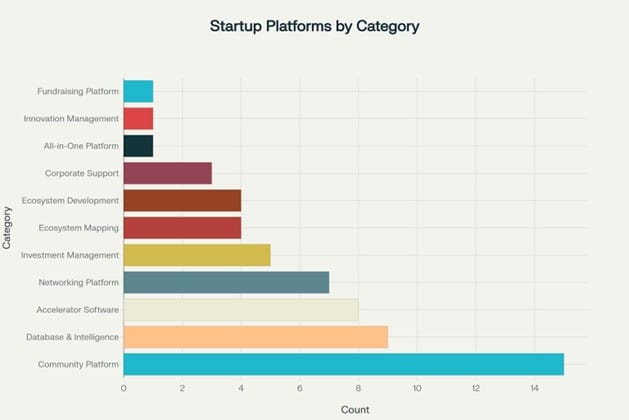How 58 platforms are reshaping startup support—and why most miss the mark on what founders need.
The startup ecosystem has exploded with specialized platforms promising to solve every founder's problem. Through comprehensive research, we've identified 58 distinct platforms across 8 primary categories, each claiming to be the missing piece in the entrepreneurial puzzle.
But here's what most get wrong: they focus on everything except execution.

The Current State: 8 Categories, One Missing Piece
The startup platform landscape breaks down into clear categories, each serving specific needs but missing the crucial element that actually drives growth.
Community Platforms (15 platforms - 26% of market)
What they promise: Networks and connections among entrepreneurs.
Platforms like Startup Grind (600+ cities globally) and Product Hunt create vibrant communities where founders share knowledge and build relationships. Indie Hackers offers transparent founder stories, while GrowthMentor connects entrepreneurs with 700+ vetted mentors.
What they deliver: Conversations, networking events, peer learning.
What they miss: Actual execution support when founders need to get things done.
Database & Intelligence Platforms (9 platforms)
What they promise: Comprehensive startup data and market intelligence.
Crunchbase leads with detailed startup profiles and funding data. CB Insights provides market intelligence, while Tracxn covers 2,500+ sectors with quarterly reports. AngelList focuses on early-stage startups seeking funding and talent.
What they deliver: Data, research, market insights.
What they miss: The bridge from insight to action. Knowing your market doesn't build your product.
Accelerator Software (8 platforms)
What they promise: End-to-end management of accelerator programs.
AcceleratorApp manages applications and cohorts. TheIncubatorPro handles startup onboarding to investor showcasing. Disco.co combines community features with AI workflows, while Babele focuses on mission-driven innovation ecosystems.
What they deliver: Program management, structured curriculum, demo days.
What they miss: Post-program support when the real work begins. Most startups need execution help long after graduation.
Networking Platforms (7 platforms)
What they promise: Professional connections and business relationships.
LinkedIn dominates with 700+ million users. b2match offers AI-powered event networking, SmartMatchApp provides business matchmaking, and Meetup connects 44+ million people based on interests.
What they deliver: Connections, introductions, networking events.
What they miss: Converting connections into actual business outcomes. Knowing people doesn't execute projects.
Investment Management Platforms (5 platforms)
What they promise: Portfolio management and investor relations.
Carta leads portfolio management for VCs. Investory.io connects 6,500+ investors with 3,000+ startups. Dealum handles angel investor networks, while Quva Angel offers customizable investment management.
What they deliver: Capital tracking, investor relations, deal flow.
What they miss: Post-investment execution support. Money in the bank doesn't automatically translate to growth.
Ecosystem Mapping Platforms (4 platforms)
What they promise: Visualization and analysis of startup ecosystems.
StartupBlink provides global ecosystem mapping. Ecosystem Map offers interactive domain-specific mapping. Deep Knowledge Analytics delivers sophisticated visualization tools, while Nesta Innovation Mapping helps policymakers navigate innovation systems.
What they deliver: Ecosystem understanding, stakeholder identification, strategic insights.
What they miss: The tactical execution needed to actually build within these ecosystems.
Ecosystem Development Platforms (4 platforms)
What they promise: Frameworks for building startup ecosystems.
Startup Commons provides open development frameworks. Startup Genome offers global benchmarking, Ecosystem.build delivers policy toolkits, and Global Entrepreneurship Network operates across 150+ countries.
What they deliver: Development methodologies, policy frameworks, regional strategies.
What they miss: Individual startup execution within these broader frameworks.
Corporate Support Platforms (3 platforms)
What they promise: Corporate-backed resources for startups.
Google for Startups offers up to $350,000 in credits and mentoring. Microsoft for Startups provides Azure credits and development tools. AWS Activate delivers cloud credits and technical training.
What they deliver: Technical resources, corporate partnerships, scaling infrastructure.
What they miss: Human execution expertise when founders need hands-on help implementing these resources.
The Execution Gap: What's Missing
Every category serves important functions, but they all share a fundamental blind spot: the gap between strategy and execution.
Founders don't just need:
- Communities to join
- Data to analyze
- Programs to complete
- People to meet
- Money to spend
- Maps to understand
- Frameworks to follow
- Resources to access
They need experts who can actually execute alongside them.
The 58-Platform Problem
With 58 specialized platforms, we've created a fragmented ecosystem where founders must navigate multiple solutions:
- Join communities for networking
- Subscribe to databases for research
- Apply to accelerators for structure
- Attend networking events for connections
- Pitch investors for capital
- Study ecosystem maps for context
- Follow development frameworks for guidance
- Access corporate resources for scaling
Each step requires new relationships, new processes, and new learning curves. Meanwhile, the core challenge remains unsolved: Who's actually going to help execute the plan?
The Integration Trend (And Why It's Not Enough)
Many platforms recognize this fragmentation and are evolving toward integrated solutions. Vestbee, for example, positions itself as an "All-in-One Platform" connecting startups, investors, accelerators, and corporates.
But integration isn't execution. Combining multiple advisory functions doesn't create hands-on implementation support.
Modern platforms increasingly incorporate AI and automation for matchmaking and content curation, but algorithms can't replace human expertise when founders need someone to actually build their go-to-market strategy, implement their technical architecture, or execute their financial planning.
What Founders Actually Need: The Missing Category
The 58-platform landscape reveals a massive gap: execution platforms.
Founders operating in the crucial £5k-£50k MRR range face a specific challenge. They've validated their concept and have early revenue, but they can't afford full-time senior talent. They need:
- Fractional expertise from operators who've built similar companies
- Aligned incentives where experts share in success outcomes
- Trust infrastructure that ensures quality and accountability
- Immediate execution rather than more advice or connections
This is where Consilience X enters the equation—not as another platform category, but as the missing execution layer the entire ecosystem needs.
Beyond Platforms: The Execution Infrastructure
While the 58 platforms focus on various aspects of startup support, they all assume founders will figure out execution on their own. CX recognizes that execution is the bottleneck.
Instead of adding to platform proliferation, CX provides what's missing: vetted experts who execute alongside founders with aligned incentives.
Where other platforms offer:
- Connections → CX delivers committed experts
- Advice → CX provides hands-on execution
- Resources → CX supplies expert implementation
- Networks → CX creates execution teams
The Future of Startup Support
The 58-platform landscape shows an ecosystem rich in tools but poor in execution support. As the market matures, the winners won't be platforms that add more features or connections.
The winners will be platforms that solve the fundamental challenge: turning strategy into results.
This requires moving beyond the platform mindset toward execution infrastructure—where experts and founders co-build startups with shared success metrics.
Conclusion: Execution Over Everything
The comprehensive analysis of startup ecosystem platforms reveals sophisticated tools for every aspect of entrepreneurship except the most crucial: execution.
While founders can now access global communities, comprehensive databases, structured programs, professional networks, investment management, ecosystem insights, development frameworks, and corporate resources, they still face the same fundamental challenge: Who's actually going to help build this thing?
The answer isn't another platform. It's an execution infrastructure that connects serious founders with expert operators who share in success outcomes.
That's not just market opportunity. That's market necessity.



